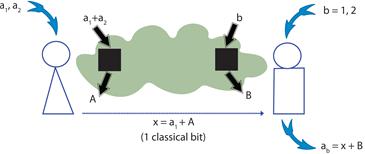Wow! This a wonderfully counter intuitive bit of social science!
Imagine that you would like to be sword swallower. In service of achieving that goal you set out to accumulate assorted accouterments: a sword, some books on sword swallowing, you study your vocabulary, you watch some videos, you take a course. Each of these moves you closer to your goal, and slowly you begin to think of your self as actually a sword swallower.
Or imagine you want to be a small businessman. You print up some business cards. You pick a name for your business. You register with the town, open a bank account. You buy a suit and start wearing it. Again each of these is a step toward constructing your new identity.
Wait! Printing up business cards doesn’t make you a small businessman. Owning a sword you intend to swallow does not a sword swallower make. Intention is a far cry from being. But, people get confused and questions arise. How often to we declare success based only on our good intentions? Do we confuse the means with the end? Of course we do. And, while the worse case delusions are obvious – a good costume doesn’t make yo a superhero – in most cases the lines are quite fuzzy.
What kicked off that musing was this wonderful article reporting four studies reported in Psychology Science: “When Intentions go Public” (pdf or pdf). I was interested in this paper because I’m interested in privacy. What happens if I show other people that sword I’ve bought? What happens when students sign one of those honor codes? What happens when a hacker publicly reveals some source code he’s working on. Does it help? Are we more or less likely to get a sword-swallower, an honorable student, or a open source contributor?
Obviously, we think that public revealing strengthens identity. We certainly wouldn’t be asking students to sign honor codes if we thought otherwise. But what if! What if it undermines their aspirations to be honorable people! I was already suspicious because of story we tell for why these things must work. I.e. that this public revealing raises the stakes, that it puts our reputation at risk. If everybody knows we have started a small business or taken up sword swallowing then we risk embarrassment when down the road we have to admit it all was a sham. But I have my doubts about that, since I doubt that stakes is an effective means to controlling behavior.
So here is the surprise. These studies suggest that public revealing of our intentions undermines our follow through. These studies are all very simple. Let’s look at one. They get a group of students who really want to become psychologists and having them filled out a survey. On the last page they ask them to write down what the intend to study next week in service of their goal. The subjects are randomly split into two groups public, and private. The kids in the private group are told that intend-to-study question was included by mistake, the experimenter tears it off and throws it away. For the public group the experiment reads over the survey with the kid. Nominally this is to check for errors, but in reality it just assures the kid knows that the experimenter knows of his study plans.
A week later they have the kids fill out a form to on which days they studied. Those who’s intentions remained private studied 40% more!
What’s going on? The theory suggests that we are keeping score on our progress toward achieving out goal. Naturally we take credit for various steps along the way. We give our self some credit for opening that business bank account, or buying that sword, or signing that honor code. The bizarre bit is that these students apparently gave themselves some points toward achieving their goal as a consequence of having it be known to another person that they intended to work on toward the goal, and feeling that they were closer they didn’t work as hard.
This is worse than confusing the means with the end. Worse than confusing having business cards with being a businessman. In this case the just telling somebody your going to buy some business cards creates a sufficiently powerful fantasy that you are a businessman that you stop working on the project.
Now if this is all true it suggests that asking students into signing honor codes make them less likely to follow through on becoming honorable. It suggests that asking your staff to outline their plan for the next week actually makes it less likely they will follow through on that plan. It suggests that signing a contract undermines rather than increases the chance the parties will do the work agreed. How weird is that!
It’s interesting that nobody I’ve told this story to finds this particularly surprising. They all agree, revealing their intentions seems to undermine their follow through. It’s all just too delightfully weird!

 .
.